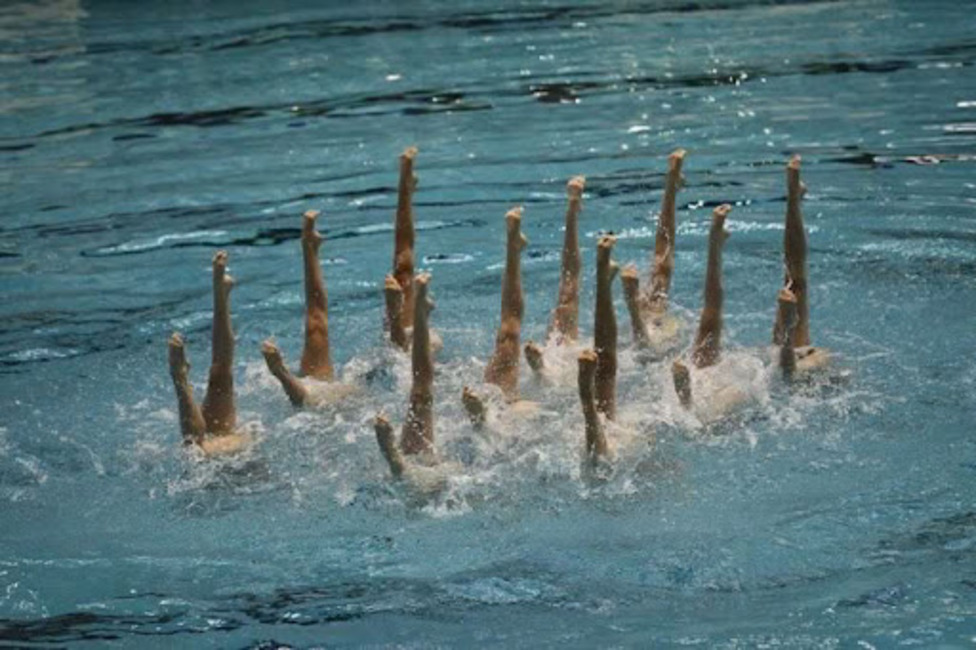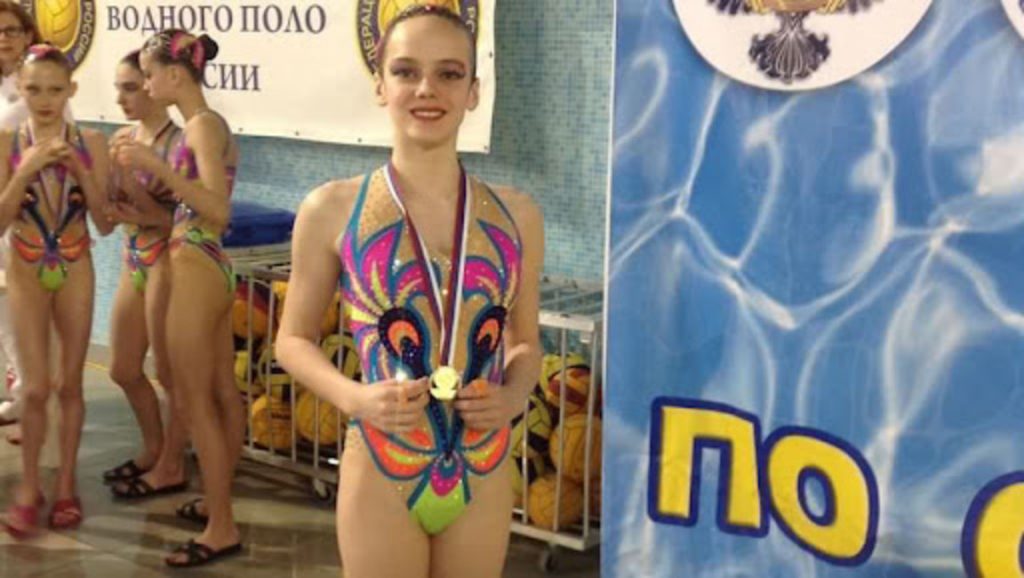Anastasia Ignaskina remembers the day 11 years ago when a synchronized swimming coach in Moscow attacked her. Back then, she was a member of the nation’s Junior Olympic team.
But she was suffering from a cold and couldn’t perform at her best. The coach, whom she declined to name, pulled her out of the pool by the hair and, she says, “physically disciplined” her.
“The trainers in Russia pushed us to the limit, often resorting to extreme measures in pursuit of perfection,” she said. “including physically fighting us over mistakes.”
Ignaskina, now a Florida International University senior, grew up a member of the demanding – and sometimes crooked – world of Russian Olympic training that has been well described since that nation’s team’s suspension from the Olympic games in 2019. From the use of needles to keep perfect posture to hair pulling, training as young Russian Olympians demanded incredible perseverance while undergoing, occasionally-disturbing training methods.
Ignaskina was born in Moscow in 2001 and began doing rhythmic gymnastics at age 2, but switched to synchronized swimming a few years later.“At first synchronized swimming wasn’t really my choice because I was too young to formally decide what I wanted to do,” she says, “But my mother wanted me to do something unique and feminine like rhythmic gymnastics or ballet or synchronized swimming, so she selected synchronized swimming because its a combination of of all these sports.”
She started competing locally against other synchronized swimming schools in Moscow and then nationally in cities throughout Russia. At age 14, her team expanded its horizons, competing internationally in Europe. Then in 2016 she competed in the Junior Olympics, in Israel.
During her international competitions, Ignaskina observed notable differences between Russian training culture and that of other countries. She remarked that Russia’s relentless pursuit of perfection was unparalleled, and detailed how Russian trainers adhered to a zero-tolerance policy regarding errors. The coaches would sometimes slap and verbally assault girls as discipline.
“To keep perfect posture, coaches would put needles under the athletes’ heels, and to keep the girls’ legs straight, they would place weights on their knees to present that desirable hypermobile feature.” Ignashkina explained. The girls were also forced to train in freezing water with weights strapped to their bodies without the chance to leave until their routine was perfect.
Ignashkina also highlighted the intense diets these young girls had to endure. To be considered in shape for the Russian standards, the girls could only eat a few hundred calories worth of food per day, even with their intensive daily routine of 12 hours of physical training and 6 hours of sleep. They were weighed every day. Gaining one gram would result in a big scandal and if a student cried, it could result in expulsion, she said.

Anastasia’s mother Elena Ignashkina, witnessed the grueling conditions her daughter endured while training for the Junior Olympics, prompting her to question the true cost of Olympic glory. “Anastasia’s training was incredibly intense, and as a mother, it was concerning to see the physical toll it took on her body at such a young age,” she recalls.
However, she recognizes the mental toughness it instilled in her daughter, and believes the skills gained from this experience prepared Anastasia to face the challenges of life beyond the Junior Olympics. “It prepared her for the hardships of university and other aspects of life, equipping her with the resilience and determination to overcome any obstacle.”
Anastasia explained the toll it took on the girl’s mental and physical health. “The extreme pressure and harsh training tactics that are employed in Russia’s Olympic training process, resulted in so many girls having body dysmorphia, anxiety, and severe consequences for those who couldn’t handle it.”
While some argue that these tactics are what made Russia a powerhouse in the Olympics, Ignashkina believes that there are areas that could be improved within the system.
Ignashkina acknowledges that, in retrospect, she would modify her approach to setting boundaries if she were to make changes to her training methods. She described that the intense Olympic environment she faced at a young age pushed her beyond her physical and mental limits, compounded by her epilepsy diagnosis, she feels that training could be modified to more sustainable methods.
Today, she emphasizes the importance of listening to her body and being attuned to her own strengths during her training. “When I train, I make a conscious effort to tune in to my body and carefully assess my ability to continue for the day,” she explains. “Now if I sense that I need to rest, I don’t hesitate to take a break and allow myself time to recover.”

Ignaskina’s reason for stopping her Junior Olympic journey was different from her peers, who quit because of their age or because they just didn’t want to compete anymore. At the age of 16 she was diagnosed with epilepsy “I had to stop because I was diagnosed with epilepsy, and obviously when you’re in the water and you have seizures, it can end your life. So that’s why I stopped performing and stopped training, and I moved to the United States, where I had my brain surgery. And now I’ve been 3 years seizure-free. And at this point, I’m thinking it’s safe to come back to synchro and to give it a second chance to get into the Olympics again.”
Despite all the hardships, Anastasia is still thankful for the opportunity to compete. “It changed my life in general because it gave me great discipline. To complete high goals, you need lots of patience, strength, and endurance, so I think I gained these qualities while competing in these sports. And now, it still helps me to achieve my goals, even academic goals. It helped me know my fullest capacity, how much I’m able to fight to get my desired results. So my sports history really helped me grasp the concept that yes everything is possible.”
According to Ignashkina’s husband, Oraz Makhmetov, her participation in the Junior Olympics has been a significant benefit to her. “Anastasia’s love for synchronized swimming and her dedication to training for the Olympics is truly inspiring. I believe that the discipline and commitment she has acquired through this experience have made her a stronger person. It’s truly admirable to see her pursue her dream of competing at the highest level.”
Despite no longer enduring the brutal training she experienced in Russia, Ignashkina still faces significant obstacles that are affecting her Olympic training. As a senior majoring in biochemistry at FIU, she feels that her college has not provided enough support, and instead, it is adding stress to her life, hampering her performance. “FIU doesn’t seem to value athletes outside of FIU, which is concerning. Students competing for FIU receive preferential treatment, such as a more relaxed approach to grading and time off from school, but this approach is not extended to Olympic athletes outside of school,” she lamented.
She also mentioned that some of her advisors acted unprofessionally, “ There have been several occasions where my advisors misguided me to take courses that I did not need to take, which was a waste of time, energy, and money that could have been devoted to training and equipment.”
Anastasia also felt that the university’s police have been failing to fulfill their duties in keeping her safe after being physically threatened by another student. “ I had some difficulties with a person who was directly threatening me saying she’s going to physically fight me, and when telling this to the police, they never even filed this as a case considering this as a ‘girl fight’. I didn’t even feel comfortable walking alone on campus. This had a toll on my mental health because I was terrified, which took away even more attention from my Olympic training.”
However, Ignashkina is trying to overcome these difficulties by staying focused on her practice. “Although these challenges affect me and push me down, I remind myself that they are temporary, and that’s what keeps me motivated.”
Ignaskina is gearing up for her next big opportunity: a tryout for the Olympics on April 16th. To impress the senior coach of the USA national team, she’s putting in the work to perfect her technical routine. If she makes the cut, she’ll have the chance to compete in the world championships this summer and begin preparing for the 2024 Olympics in Paris. Even with her sights set on athletic success, she is also looking towards pursuing her graduate studies once her athletic career comes to a close.
While every Olympic athlete has a unique journey, Ignaskina’s story serves as a relatable experience for athletes worldwide. The pursuit of perfection and the pressure to succeed amidst intense coaching are controversial ways to spend one’s childhood. Nevertheless, these experiences have shaped Ignashkina into the resilient and determined athlete she is today. Despite the difficulties she faced, Ignashkina reflects on her journey with gratitude, acknowledging the impact it has had on her life and the invaluable lessons it taught her.
“Yes, it was tough,” she admits, “but I am grateful for the opportunities it provided me with and for preparing me to overcome the obstacles I face today.”

































